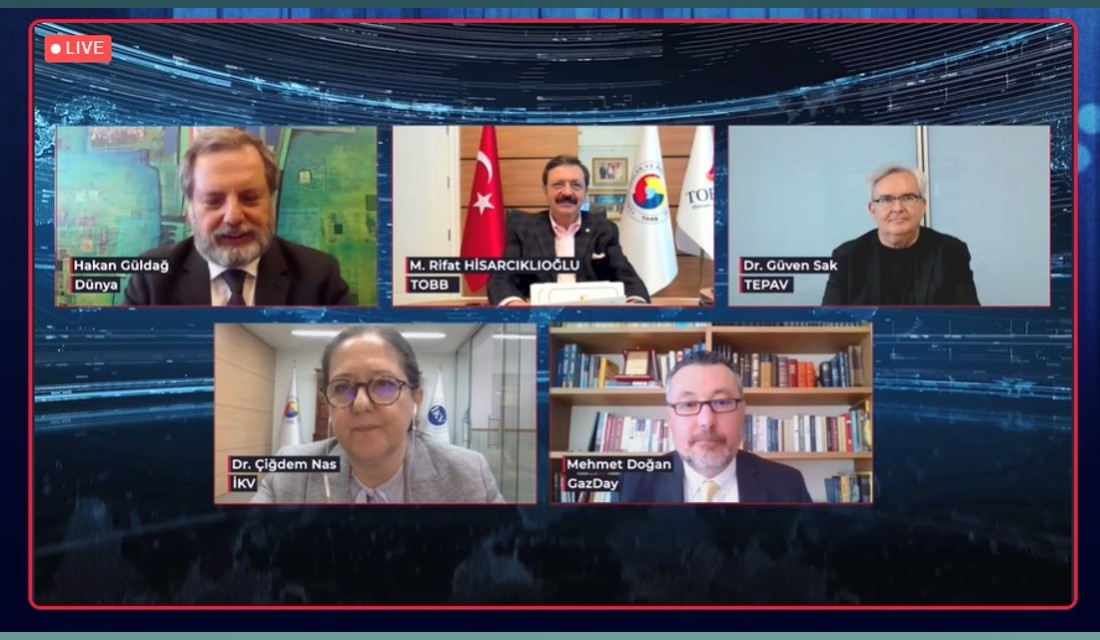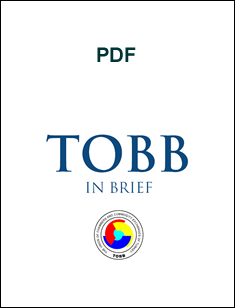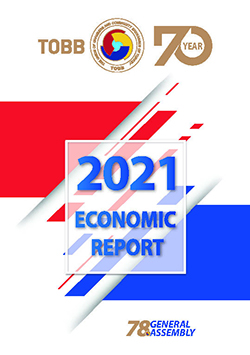“There is a lot of work to be done for the green transformation. It's important that we are aware of that.”

23.05.2022 / ANKARA
The Union of Chambers and Commodity Exchanges of Turkey (TOBB) President M. Rifat Hisarcıklıoğlu attended the report launch webinar prepared by TEPAV “How Ready Are Turkish Companies for Green Transformation? Carbon Regulation Sectors at the Border Ready for a Green Deal.”
In his opening speech, Hisarcıklıoğlu stated that he believes that with this report, the situation of companies in the green transformation process will be revealed in the clearest way, thus they will make the most concrete and clear contribution to the preparation of relevant public policies.
Emphasizing that the green deal process is one of the issues that will shape the future, Hisarcıklıoğlu stated that as TOBB, they have prepared the Chambers and Commodity Exchanges and sectors for the effects of the European Green Deal and the green transformation and have developed their institutional capacities.
Hisarcıklıoğlu, stating that they brought together the sectors that will be most affected and the public and prepared the road map of the sectors together, said, “We are carrying out studies for the transition of SMEs to a green and circular economy. Thus, we are leading the green transformation of the Turkish business world. We plan to offer services for certification needs such as carbon footprint and greenhouse gas verification to our companies in the near future.”
Reminding that the main goal of the EU Green Deal is to be the first carbon neutral continent by 2050, Hisarcıklıoğlu said, “It aims to equalize the carbon price of EU products and imported products. In order to achieve this equality, it is envisaged that imported products will be subject to some kind of tax on entry into the EU market. This will affect many areas of daily life and our lifestyles as producers, exporters or consumers. For example, the carbon regulation mechanism at the border is among the legislation that attracts the most attention in our country in this process. Because it covers very important production and export sectors such as automotive, iron and steel, cement, fertilizer and aluminum in terms of our country. In addition, this scope will expand to a very wide area and sub-sectors from textiles to chemicals in the future.”
On the other hand, Hisarcıklıoğlu said that the EU is no longer only focused on making the product safe and green, but also on determining all production and supply processes, and continued: “It reorganizes or prohibits the use of many drugs, additives and pesticides in agriculture and food production. By regulating tree cutting and tracking, it redefines the rules for market entry of wood products, especially furniture, not only to protect the environment. Therefore, in terms of trade, not only measures but also process managements come to the fore. On the other hand, the Russian-Ukrainian war, on the one hand, brings the issue of energy security to the forefront, and on the other hand, accelerates the energy transition. EU countries aim to reduce their dependence on energy raw materials from Russia and diversify fossil fuel source countries.”
Emphasizing that all these increase the importance of Turkey and create new opportunities, the TOBB President said, “Because the Mediterranean geography is on its way to becoming a very important basin where the production and trade of green hydrogen will be made. Green hydrogen also requires significant renewable energy capacity. Turkey has the capacity to become a major producer and exporter of green hydrogen in its region. Our country ranks 5th in Europe with its electricity installed capacity and 3rd in Europe with the size of the electricity market. Half of our installed power and total electricity production is based on domestic and renewable resources. We are the largest geothermal country in Europe. We are ranked 12th in the world in terms of wind energy installed power. We are also taking serious steps in the fields of rooftop solar energy panels and energy efficiency. All this shows that the energy cooperation between Turkey and the EU, which has traditionally progressed, is not only limited to natural gas and electricity, but can also spread to the fields of hydrogen and renewable energy, which will be increasingly prominent in the coming period.”
Hisarcıklıoğlu, stating that how to regulate the Emission Trading System is an important issue in order to achieve Turkey's 2053 targets and is very important in terms of ensuring fair transformation, said, “In this way, we can maintain our presence and competition in the EU market more strongly. In addition, by using our own mechanism in imports, we can protect our market from the pressure of products with lower carbon standards by third countries. At this point, the current integration and Customs Union between the EU and our country also come to the fore. The EU is an important regulator depending on its place in the world economy and trade. Our country has been in the Customs Union for more than a quarter of a century. Therefore, our country already has a deep integration with the EU and a legal framework that is highly compatible with the EU in many areas of the economy and trade. For this reason, this economic transformation that is taking place next to us directly affects and will affect Turkey as well. However, instead of perceiving this interaction as a threat, it is also possible to see it as a new opportunity that will carry our trade and economic relations not only with the EU but also with the whole world to a higher stage and transform our production infrastructure and improve our competitiveness, as in the case of the Customs Union.”
Stating that there is a lot of work to be done for the green transformation, Hisarcıklıoğlu said, “It is important that we are aware of this. But we also need to do justice to our capacity, our adaptability and adaptability. Of course, we need to constantly remind the EU that this is a process that will be carried out in cooperation, not alone, and that it can only be achieved by acting together, regardless of its scope and financial resources, without leaving anyone behind. The Green Deal is an extension of our long-standing partnership relationship with the European Union and one of the most critical issues on the positive agenda with the EU. For Turkey's exports, in particular, to continue in a sustainable manner, the compliance of our industrialists with the Green Deal is critical. Thus, we should take a stronger place in both the EU and the world market by developing climate-friendly products and processes that will not be affected by the costs of this new legislation, especially carbon regulation at the border. Therefore, there is no going back in this process. Therefore, we should also have a road map.”
Stating that digital rules will affect the manufacturing industry as well as services, Hisarcıklıoğlu said: “Services and digital trade will be an important negotiation area in updating the Customs Union. In this context, it is important that our private sector closely follows the EU regulations on digitalization as well as digital transformation. The Digital Compass will have significant global consequences that will directly affect our country. Significant investments will be made for the digital transformation of enterprises, the use of artificial intelligence and the digitalization of public services. In particular, the digital equipment of young people will need to be improved. In summary, if we are prepared for the future and make the right planning, we will be among the winners of all these processes. I believe that the report prepared by TEPAV and to be announced today will shed light on both the private sector and the public administration and will be a reference source while preparing the road map.”
Following the opening speech, the results of the report were presented by TEPAV Founding Director Güven Sak. Afterwards, the main findings and the steps that Turkish companies should take for the green transformation were discussed in the panel moderated by Hakan Güldağ, Chairman of the Board of Directors of Dünya Newspaper, and attended by Çiğdem Nas, Secretary General of the Economic Development Foundation (IKV), and Mehmet Doğan, General Manager of GazDay.
Your message has been sent
Thank you |




